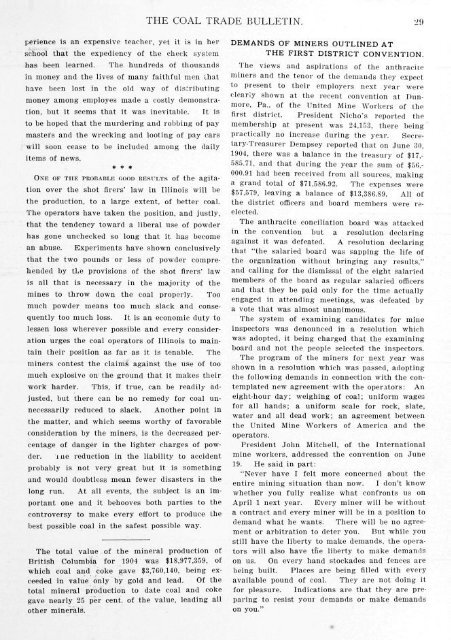COAL - Clpdigital.org
COAL - Clpdigital.org
COAL - Clpdigital.org
You also want an ePaper? Increase the reach of your titles
YUMPU automatically turns print PDFs into web optimized ePapers that Google loves.
perience is an expensive teacher, yet it is in her<br />
school that the expediency of the check system<br />
has been learned. The hundreds of thousands<br />
in money and the lives of many faithful men that<br />
have been lost in the old way of distributing<br />
money among employes made a costly demonstra<br />
tion, but it seems that it was inevitable. It is<br />
to be hoped that the murdering and robbing of pay<br />
masters and the wrecking and looting of pay cars<br />
will soon cease to be included among the daily<br />
items of news.<br />
* * *<br />
ONE OF THE PROBABLE OOOD RESULTS of the agita<br />
tion over the shot firers' law in Illinois will be<br />
the production, to a large extent, of better coal.<br />
The operators have taken the position, and justly,<br />
that the tendency toward a liberal use of powder<br />
has gone unchecked so long that it has become<br />
an abuse. Experiments have shown conclusively<br />
that the two pounds or less of powder compre<br />
hended by the provisions of the shot firers' law<br />
is all that is necessary in the majority of the<br />
mines to throw down the coal properly. Too<br />
much powder means too much slack and conse<br />
quently too much loss. It is an economic duty to<br />
lessen loss wherever possible and every consider<br />
ation urges the coal operators of Illinois to main<br />
tain their position as far as it is tenable. The<br />
miners contest the claims against the use of too<br />
much explosive on the ground that it makes their<br />
work harder. This, if true, can be readily ad<br />
justed, but there can be no remedy for coal un<br />
necessarily reduced to slack. Another point in<br />
the matter, and which seems worthy of favorable<br />
consideration by the miners, is the decreased per<br />
centage of danger in the lighter charges of pow<br />
der, ine reduction in the liability to accident<br />
probably is not very great but it is something<br />
and would doubtless mean fewer disasters in the<br />
long run. At all events, the subject is an im<br />
portant one and it behooves both parties to the<br />
controversy to make every effort to produce the<br />
best possible coal in the safest possible way.<br />
The total value of the mineral production of<br />
British Columbia for 1904 was $18,977,359, of<br />
which coal and coke gave $3,760,140, being exceeded<br />
in value only by gold and lead. Of the<br />
total mineral production to date coal and coke<br />
gave nearly 25 per cent, of the value, leading all<br />
other minerals.<br />
THE <strong>COAL</strong> TRADE BULLETIN. 2M<br />
DEMANDS OF MINERS OUTLINED AT<br />
THE FIRST DISTRICT CONVENTION.<br />
The views and aspirations of the anthracite<br />
miners and the tenor of the demands they expect<br />
to present to their employers next year were<br />
clearly shown at the recent convention at Dunmore,<br />
Pa., of the United Mine Workers of the<br />
first district. President Nicho's reported the<br />
membership at present was 24,153, there being<br />
practically no increase during the year. Secretary-Treasurer<br />
Dempsey reported that on June 30.<br />
1904, there was a balance in the treasury of $17,-<br />
585.71. and that during the year the sum of $56.-<br />
000.91 had been received from all sources, making<br />
a grand total of $71,586.92. The expenses were<br />
$57,579, leaving a balance of $13,386.89. All of<br />
the district officers and board members were reelected.<br />
The anthracite conciliation board was attacked<br />
in the convention but a resolution declaring<br />
against it was defeated. A resolution declaring<br />
that "the salaried board was sapping the life of<br />
the <strong>org</strong>anization without bringing any results,"<br />
and calling for the dismissal of the eight salaried<br />
members of the board as regular salaried officers<br />
and that they be paid only for the time actually<br />
engaged in attending meetings, was defeated by<br />
a vote that was almost unanimous.<br />
The system of examining candidates for mine<br />
inspectors was denounced in a resolution which<br />
was adopted, it being charged that the examining<br />
board and not the people selected the inspectors.<br />
The program of the miners for next year was<br />
shown in a resolution which was passed, adopting<br />
the following demands in connection with the contemplated<br />
new agreement with the operators: An<br />
eight-hour day; weighing of coal; uniform wages<br />
for all hands; a uniform scale for rock, slate,<br />
water and all dead work; an agreement between<br />
the United Mine Workers of America and the<br />
operators.<br />
President John Mitchell, of the International<br />
mine workers, addressed the convention on June<br />
19. He said in part:<br />
"Never have I felt more concerned about the<br />
entire mining situation than now. I don't know<br />
whether you fully realize what confronts us on<br />
April 1 next year. Every miner will be without<br />
a contract and every miner will be in a position to<br />
demand what he wants. There will be no agreement<br />
or arbitration to deter you. But while you<br />
still have the liberty to make demands, the operators<br />
will also have the liberty to make demands<br />
on us. On every hand stockades and fences are<br />
being built. Places are being filled with every<br />
available pound of coal. They are not doing it<br />
for pleasure. Indications are that they are preparing<br />
to resist your demands or make demands<br />
on you."
















